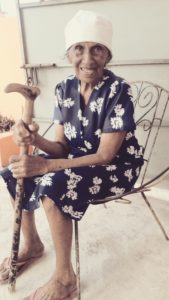The United Nations (UN) designated October 1 as the International Day of Older Persons. This year’s theme is: “Stepping into the Future: Tapping the Talents, Contributions and Participation of Older Persons in Society”.
In observance of this day, Sunday Times Magazine interviewed 90-year-old Angannie Roopchand – who outlined some powerful life lessons and her opinion on how we all can make the lives of our senior citizens better.
International Day of Older Persons
According to the United Nation’s website (www.un.org), “this year’s day is about enabling and expanding the contributions of older people in their families, communities and societies at large. It focuses on the pathways that support full and effective participation in old age, in accordance with old persons’ basic rights, needs and preferences”.

The UN went on to explain that this year’s theme underscores the link between tapping the talents and contributions of older persons and achieving the implementation of the 2030 Agenda and the Madrid International Plan of Action on Ageing, which is currently undergoing its third review and appraisal process.
Between 2015 and 2030, the target date for the Sustainable Development Goals, the number of older persons worldwide is set to increase by 56 per cent — from 901 million to more than 1.4 billion. By 2030, the number of people aged 60 and above will exceed that of young people aged 15 to 24.
“Stepping into the future with pledges that no one will be left behind, it is starkly evident that the need to tap into the often overlooked and under-appreciated contributions of older persons is not only essential to older persons’ well-being, but also imperative for sustainable development processes. The 2017 theme will explore effective means of promoting and strengthening the participation of older persons in various aspects of social, cultural, economic and civic and political life,” the organisation pointed out.
Life lessons from a 90-year-old
Angannie Roopchand grew up with four sisters and three brothers, who she described as “fun”, in Cornelia Ida – a “simple” village on the West Coast of Demerara.
Remembering her parents, Angannie said they were strict and ensured they attended school regularly. She also recalled how serious her father – who came to Guyana as a six-month-old baby from Calcutta, India – was about his children taking Hindi classes after school.
“My parents always warn us [her and siblings] not to fight with each other; always tell everybody good morning and good afternoon. They teach us to behave decently and treat our neighbours and people in the village with respect. We couldn’t call people by them full name, we had to say uncle or aunty or brother or sister,” she remembered. The matriarch observed that in modern times parents are not inculcating these values in their children.
Angannie expressed her life was her children; “it was her richness and joy”. She has 11 children: seven sons and four daughters. Her family was her strength and her pride. Seeing her children grow up, get married and fill her life with grandchildren and great-grandchildren added to her happiness.
The 90-year-old stated she did several jobs to “feed the many kids” in her family. She cultivated rice, planted vegetables and reared poultry. The vegetables and fruits from her backyard were sold at the market. Additionally, she sold confectionaries at the primary school in her village.
She credits her diet, which consists of mostly vegetables and dhal, for being healthy at 90 years old. Angannie explained in the earlier years of her life, her diet was mostly eggs and poultry, which she reared in her yard. However, after marriage fish was her only source of meat. In the latter part of her life, she usually begins her morning with a cup of oats porridge.
Throughout her 90 years, Angannie said she has learned a lot of life lessons. “When you dead you don’t carry anything with you. And know that nothing last forever. We must always live good with everybody, and just like how you want people to be nice to you so you got to be nice to them.”
Having worked tirelessly in her earlier years, Angannie eagerly looks forward for her pension every month to care for her needs. She insists that a much-needed raise in pension will benefit not only her, but every other elderly person in the country. Additionally, establishing homes in villages for elders who do not have children to care for them is something she thinks would be helpful.
“If we can go back to helping people in the community would be good too. In the old days, you hadn’t be family before somebody could help you. But this culture die away now; everybody care for themself alone. This time nag lang time,” she declared.
As we observe International Day of Older Persons, let’s all come together to fulfil Angannie’s wishes of showing extra care and consideration to all our senior citizens who contributed, one way or the other, to the development of our nation.



